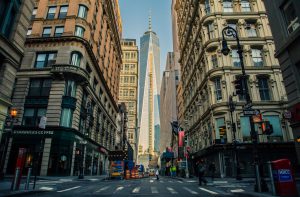
With economic growth gradually declining since the 1980s and in the first quarter of 2017 possessing a growth-rate of only 0.7 percent, the United States is not headed in a direction of growth and prosperity. In a new article for The Stream, Acton’s Director of Research, Samuel Gregg, highlights this current trend, pointing to an aging population and over-regulation as likely culprits. He also affirms the necessity of innovation and the alleviation of burdensome regulations. Gregg begins by articulating the current state of the U.S. economy:
How is America doing? Not well. In the first quarter of 2017, the U.S. growth-rate was a mere 0.7 percent. That’s the lowest since 2014. In fact, between 2010 and 2016, the economy grew at an annual average of only 2.1 percent. That’s more than one percentage point lower than the average rate of 3.21 percent since 1947.
But why should we care? At the moment, America’s unemployment rate is below 5 percent. Surely, some say, what matters is that the economy doesn’t shrink. In our equality-obsessed age, should we accept a lower and slower rate of growth if it means the benefits are distributed more evenly?
Unfortunately, a persistently low growth rate usually means there are deep-seated problems in the economy. If they aren’t addressed that means problems in the long-term for all of us. Especially for the less-well off.
Weary of a declining growth rate, Gregg thinks this trend may be a reflection of more “deep-seated problems” in the economy. A decrease in innovation, especially new patents, and increased cultural and economic risk-aversion are likely culprits:
Alas, we’re losing our edge. Sign after sign points to marked slowdown in innovation throughout America. One measure is new patents issued for inventions. Those numbers show the United States falling behind other countries. A recent report released by the Kauffman Foundation warns that “entrepreneurial dynamism remains in a decades-long decline” in America.
Some economists argue that this is broader trend. America is becoming middle-aged. It’s a more risk-adverse, economically-complacent nation. We still talk about being a vibrant market-driven society. But much of America has adopted the economic and cultural priorities of your average European social democracy.
In accordance with these problems, Gregg targets over-regulation:
Closely linked with declining innovation is stifling regulation. According to a 2016 Mercatus Center study, “Economic growth in the United States has, on average, been slowed by 0.8 percent per year since 1980 owing to the cumulative effects of regulation.” Both parties have been complicit in this trend.
Keep spinning new regulations, and the result is clear. It influences the decisions made by investors and entrepreneurs — usually for the worse. Excessive regulation may, for instance, cause people to invest in an area of the economy that’s freer but less productive. Dealing with regulatory barriers can be tiresome and expensive.
It gets worse. Over-regulation can encourage businesses and potential entrepreneurs to play the crony capitalist game. They decide they’re better off working to extract privileges from the government. It’s easier than innovating. Consumers lose out on new and improved products or services, and lower prices.
In conclusion, Gregg does not idealize economic growth as an end unto itself, but a means to an end, articulating its vital role in the reduction of poverty and the realization of human flourishing.
Economic growth isn’t the solution to all of humanity’s problems. As no less than Adam Smith understood, it’s a means to an end — not an end in itself. It can even fuel the perennial temptations associated with materialism. But that’s no excuse for trivializing growth. It is hugely important to societies that want to reduce poverty — and achieve less material goals, like increasing education. It’s harder for people to pursue goods like education or fulfill their family responsibilities in an anemic or stagnant economy.
Put another way: if America wants to be great in the fullest sense of that word again, more lasting and higher economic growth isn’t an optional-extra. It’s a necessity.
To read the original article, click here.
Image: CCO
